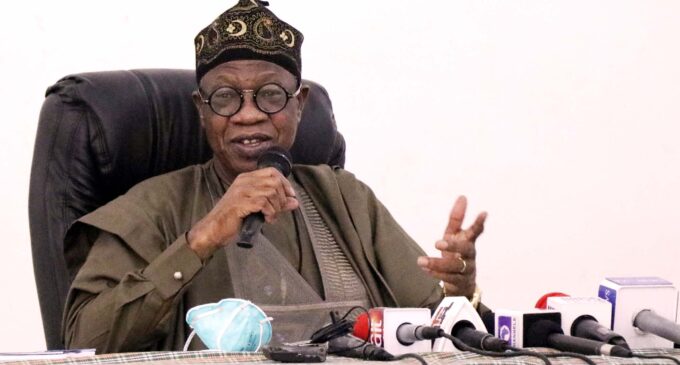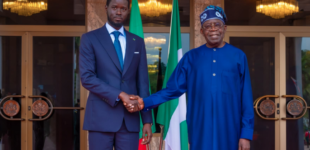For broadcasting, a tale of contradictions and apprehensions

Understandably the Nigerian government last week hailed media entrepreneur and emerging movie maker, Mo Abudu, for notching up a deal with global streaming outfit, Netflix, for on-screen adaptation of Wole Soyinka’s ‘Death and The King’s Horseman’ and Lola Shoneyin’s ‘The Secret Lives of Baba Segi’s Wives’.
The partnership described by the Minister of Information and Culture, Alhaji Lai Mohammed as another feather to Mo Abudu’s already well-adorned creative cap, will result in the creation of two original series as well as multiple Netflix-branded films.
”Coming after Netflix’s first Nigeria original film, Lionheart, this is a great recognition of the immense creative talents that abound in Nigeria and the provision of a global platform for Nigeria storytelling,” the Minister enthused.
Forgive my shame. I know very little about Shoneyin’s work although this may not be for long, but I have been part of a group that produced Death and the Kings Horseman on stage, besides using it as a text in school. The play is a sustained evocative chant, a carefully woven poetic fluidity whose entertainment lore makes lithe and accommodating the seriousness of a creative masterpiece and a cultural reference point. Each time I ask myself, at what spiritual level was Soyinka operating when he created that masterpiece?
The answer may never come but faithfully interpreting that work with some level of boldness and some dash of cinematic genius and tech peppering, will perhaps transmute the work to a new age of cultural appreciation, acceptance and preservation. It will transcend time and generations and come to our children in the language they understand.
This kind of partnership is an affirmation of the country’s cultural buoyancy which can only attract more interests from within and abroad as it will provide very rich entertainment content for the television. Will such work enjoy the protection of the sixth edition of the Broadcasting Code?
This question may rile some people who believe that the new Broadcasting Code is already sacrosanct, if ever a document can be. The Code released recently has attracted very sharp reactions from different stakeholders of the industry. For some, the real deal has come for Nollywood to begin to make money while for others, it is like a book of satanic verses: it will scare investors away.
Roundly, there is superficiality in our response to a very complicated document instead of sturdy circumspection in looking at the details which, as they say, always house the devil. And there are many in this document which make it worrisome to a section of the industry.
But there is what seems to be a measured response by Mr Godfrey Ohuabunwa, Chairman Association of Licensed STB Manufacturers of Nigeria, who is also the Vice Chairman of the Broadcasting Organisation of Nigeria (BON). “On the issue of Monopoly and what the Code intends to achieve,” Ohuabunwa explained, “the amended Code is in our favour. It discourages warehousing of contents and creates more businesses for both platform owner and the broadcasters. It is not in any way against competition or investment. The core point is that henceforth you must sublease to other platforms and give subscribers and customers at all level the opportunity to view the content while you are still making money from everyone.”
Founder of IrokotTV, Jason Njoku is not as fascinated with the development but instead expressed disgust and apprehension as he unleashed a Twitter blitz. “Nigeria Broadcasting Commission (NBC) in making exclusivity illegal, compelling sub-licensing of content and regulating price, are effectively turning the private enterprise into state property. Interference distorts markets. If implemented, this 100% destroys PayTV in Nigeria.”
There are quite some other reactions. For instance the amendment which gives movie makers and broadcasters the opportunity to earn more from advertising has presented some honey appeal to the industry with some members already punching the calculator to know how much is due them in the short term!
But in trying to calm industry anxieties on Monday, Acting Director General of the National Broadcasting Commission (NBC), Prof Armstrong Idachaba informed that the amendments were being carried out for the benefit of the various stakeholders in the broadcast industry.
“The Commission wishes to reiterate the fact that the objectives of the amendments are in our National Best interest. We currently have a highly rated and hugely talented creative industry in Nigeria but the facts remain that content producers are unable to harness the benefits of their creative endowment due largely to monopolistic restrictions and anti-competitive behaviour. The current amendment aims to reposition the Nigerian broadcasting industry and to make it more responsive to emerging realities,” he said.
Armstrong anchored his position on Sections 6.2.8. and 9.0.1, which particularly forbid exclusivity in the industry, especially, 9.0.1 which states that “a Broadcaster or licensee shall immediately after the coming into force of this Amendment be prohibited from effecting informal agreements, written and oral agreements, explicit or implicit understandings or implementing concerted practices either exclusively or between market players that have as their object, intent, effect or purpose the restriction of competition, abuse of a dominant position or of substantial market power or create barriers to entry in the broadcast media industry in Nigeria.”
How this works will unfold in the days ahead. As it is, so many players are digging deep and taking very firm positions on how to handle what portends a tinder situation awaiting a little spark. But a commonality at the centre of this rumbling development is that, at the end of the day, all parties irrespective of concerns, will have to subject themselves to modern business practices which rest on profit and shared interests.
Okoh Aihe writes from Abuja
Views expressed by contributors are strictly personal and not of TheCable.










There are no comments at the moment, do you want to add one?
Write a comment